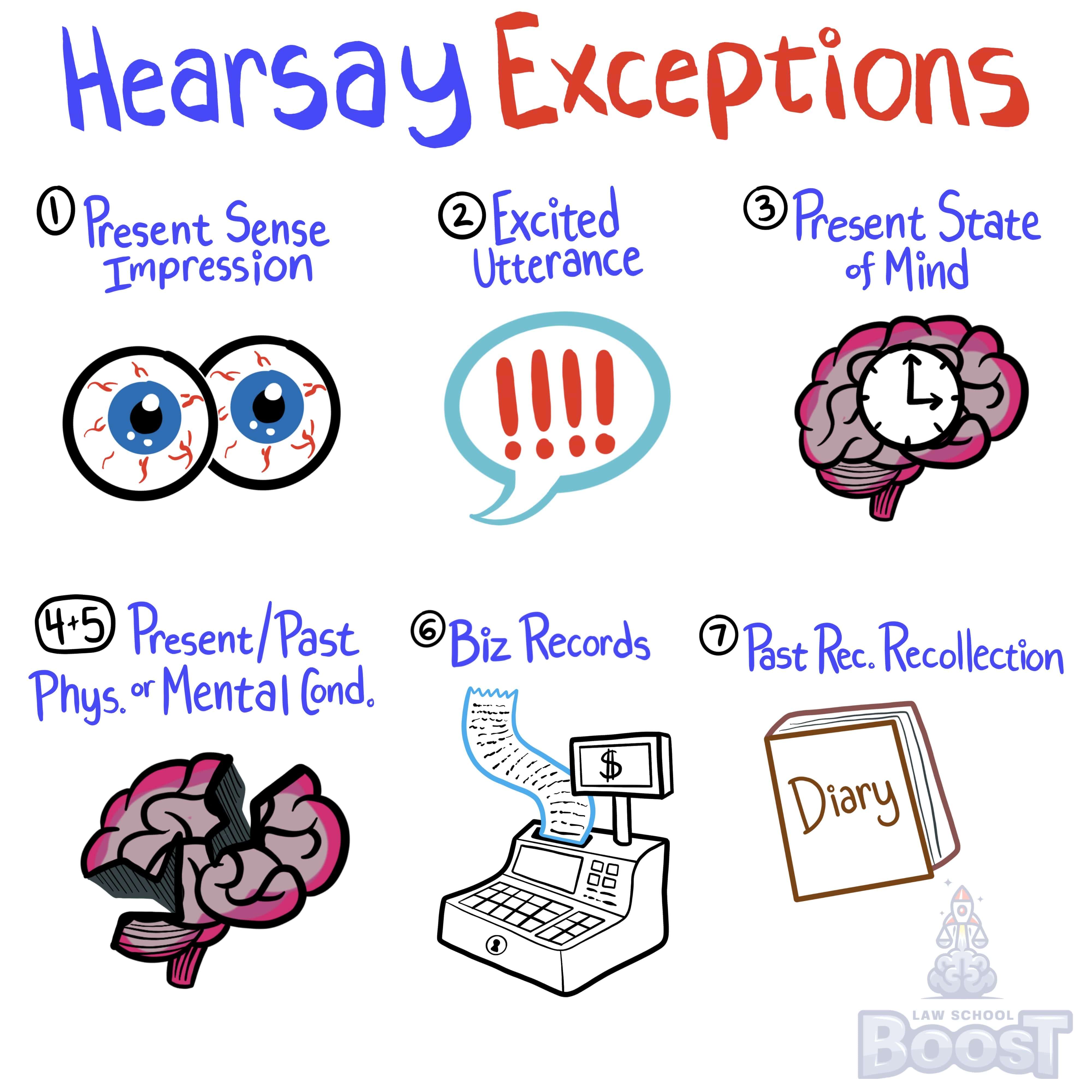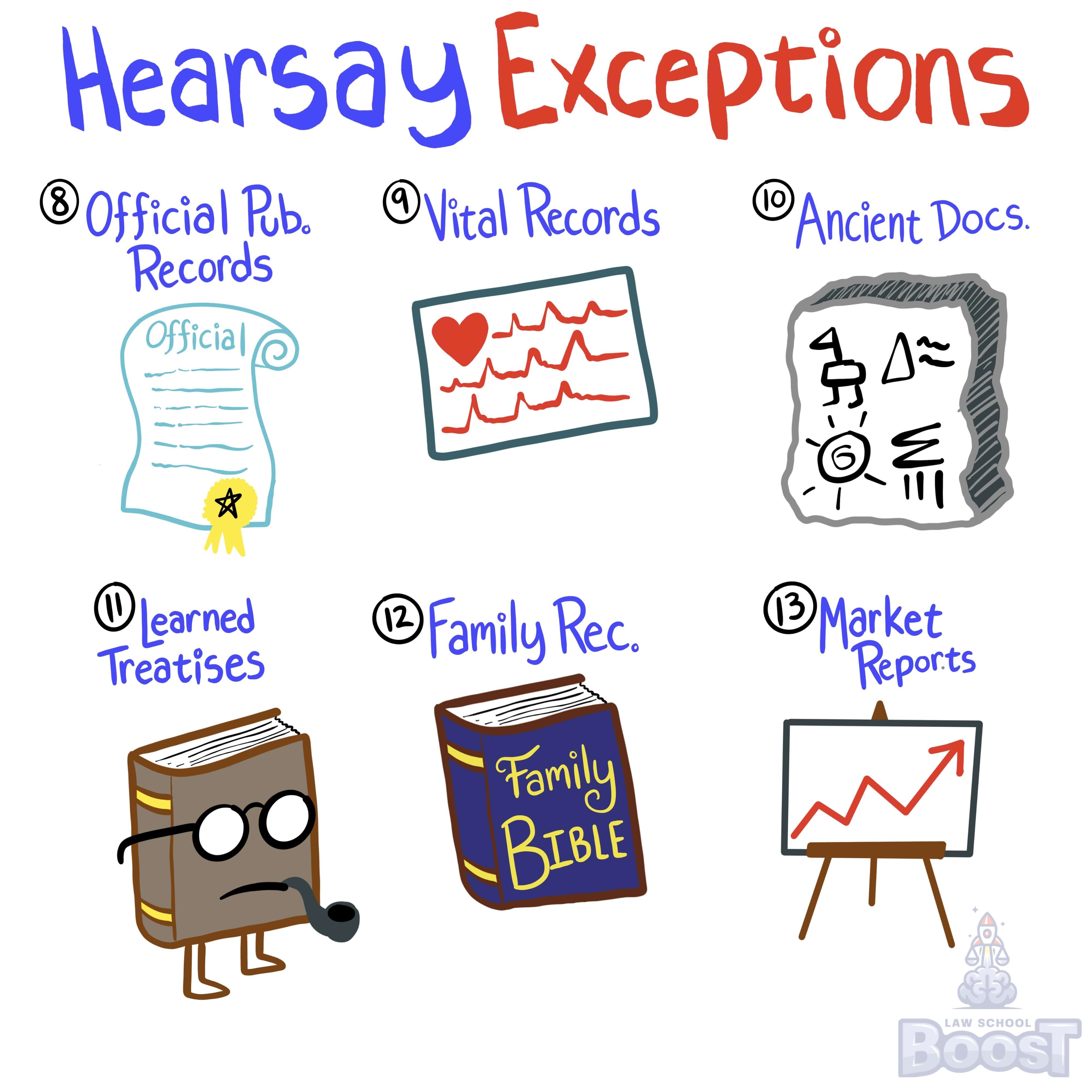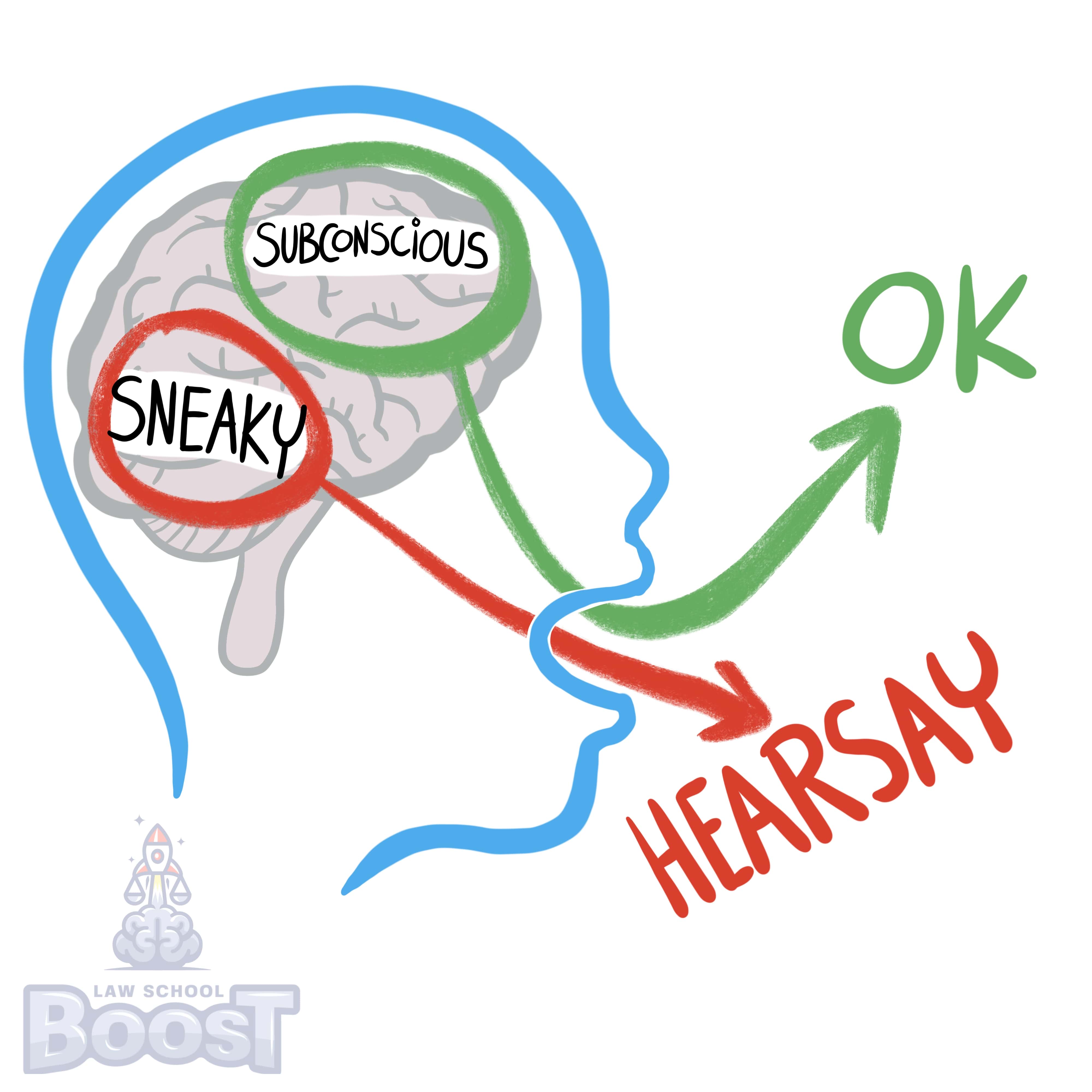🦅
Federal Evidence • Hearsay Exceptions - Unavailability NOT Required
EVID#053
Legal Definition
The past recorded recollection hearsay exception applies to writings made or adopted by a witness who cannot now remember the facts, made while the facts were fresh in their mind. They are read into evidence.
It doesn't matter whether the witness is available or not.
It doesn't matter whether the witness is available or not.
Plain English Explanation
In another card, you learned that writings or objects may be used to help refresh the memory of a witness but they are not allowed to read the writing into the record. So it may be a bit confusing how the past recorded recollection hearsay exception seems to say the opposite. Let's unpack it and explain.
The goal of preventing hearsay from entering the court is to stop untruthful (or inaccurate) information from being entered into evidence where opposing parties are unable to scrutinize the person who made such statements because it's not fair to the process of trying to figure out what is true.
Imagine you have a case where Bob is suing a hospital for negligence due to harm caused from a surgery procedure he had 10 years ago. Bob had his appendix taken out and, in recent years, experiences horrible pain in his abdominal area. After getting an Xray, it is discovered that a wedding ring was somehow left inside of his body. During the trial, Sam is called as a witness. Sam was one of the doctors in the room the day Bob was having his surgery. When Sam is asked to testify about what he remembers about Bob's surgery, Sam is initially unable to do so because it was so long ago and Sam has witnessed so many surgeries. At this point, there may be 2 scenarios that play out:
Scenario 1 is that when Sam is asked about Bob's surgery 10 years ago and says he can't remember, he is provided with some medical documents about Bob and the surgery. These documents may be enough to jog Sam's memory. Sam may review them and say, "Oh! Bob? Yeah, I remember that surgery now!" At this point, Sam's memory has been refreshed and he is able to testify about what he remembers. The documents themselves aren't allowed to be read into the record because they aren't an issue anymore — Sam's refreshed testimony is all that matters, and opposing counsel now has a chance to try to poke holes in it and scrutinize his statements being made in court.
Scenario 2: is that when Sam is asked about Bob's surgery 10 years ago and says he can't remember, he is provided a copy of an email he sent to a colleague that he wrote on the day of Bob's surgery. The email says, "What a rough day. We were operating on this man to remove his appendix but one of the other surgeons lost their ring so we had to spend an extra hour looking around for it. We never ended up finding it. That idiot probably just left it at home or something." When Sam reads this, it still doesn't jog his memory about the event, so he is unable to now make statements about them. However, Sam can be asked whether he recognizes the note and can attest to the fact that it is something he would have written down back when the event happened. Sam may say, "Yes, this email comes from my account and is the type of email I would have written to a friend. I don't remember writing this email specifically since I have assisted in hundreds of surgeries over the last 10 years, but I definitely recognize this as being my mine and accurate to something I saw since I wouldn't have just made that up." At this point, Sam would be able to read the record into evidence because he is essentially vouching for its authenticity.
Note that Sam doesn't necessarily need to be available as a witness in court for this to apply if he had previously vouched for the document's authenticity. Imagine if Sam was asked about the email in an earlier deposition and said the same thing above but the next day, before trial, he is hit by a bus. Bob could still introduce the record into evidence by showing Sam had previously attested to its authenticity but were unable to recall the event personally.
The goal of preventing hearsay from entering the court is to stop untruthful (or inaccurate) information from being entered into evidence where opposing parties are unable to scrutinize the person who made such statements because it's not fair to the process of trying to figure out what is true.
Imagine you have a case where Bob is suing a hospital for negligence due to harm caused from a surgery procedure he had 10 years ago. Bob had his appendix taken out and, in recent years, experiences horrible pain in his abdominal area. After getting an Xray, it is discovered that a wedding ring was somehow left inside of his body. During the trial, Sam is called as a witness. Sam was one of the doctors in the room the day Bob was having his surgery. When Sam is asked to testify about what he remembers about Bob's surgery, Sam is initially unable to do so because it was so long ago and Sam has witnessed so many surgeries. At this point, there may be 2 scenarios that play out:
Scenario 1 is that when Sam is asked about Bob's surgery 10 years ago and says he can't remember, he is provided with some medical documents about Bob and the surgery. These documents may be enough to jog Sam's memory. Sam may review them and say, "Oh! Bob? Yeah, I remember that surgery now!" At this point, Sam's memory has been refreshed and he is able to testify about what he remembers. The documents themselves aren't allowed to be read into the record because they aren't an issue anymore — Sam's refreshed testimony is all that matters, and opposing counsel now has a chance to try to poke holes in it and scrutinize his statements being made in court.
Scenario 2: is that when Sam is asked about Bob's surgery 10 years ago and says he can't remember, he is provided a copy of an email he sent to a colleague that he wrote on the day of Bob's surgery. The email says, "What a rough day. We were operating on this man to remove his appendix but one of the other surgeons lost their ring so we had to spend an extra hour looking around for it. We never ended up finding it. That idiot probably just left it at home or something." When Sam reads this, it still doesn't jog his memory about the event, so he is unable to now make statements about them. However, Sam can be asked whether he recognizes the note and can attest to the fact that it is something he would have written down back when the event happened. Sam may say, "Yes, this email comes from my account and is the type of email I would have written to a friend. I don't remember writing this email specifically since I have assisted in hundreds of surgeries over the last 10 years, but I definitely recognize this as being my mine and accurate to something I saw since I wouldn't have just made that up." At this point, Sam would be able to read the record into evidence because he is essentially vouching for its authenticity.
Note that Sam doesn't necessarily need to be available as a witness in court for this to apply if he had previously vouched for the document's authenticity. Imagine if Sam was asked about the email in an earlier deposition and said the same thing above but the next day, before trial, he is hit by a bus. Bob could still introduce the record into evidence by showing Sam had previously attested to its authenticity but were unable to recall the event personally.
Hypothetical
Hypo 1: Bob is being sued for a car accident that happened 5 years ago. Sam, a witness, wrote a detailed note about the accident right after it happened. In court, Sam can't remember the details. Result: Sam's note can be read in court as evidence since it was written when his memory was fresh, even though he can't remember now.
Hypo 2: Sam is suing Bob's company for a slip and fall incident that occurred 3 years ago. Bob, a security guard, had written a report about the incident. Bob has since retired and can't recall the event, but his report details the unsafe conditions that led to Sam's fall. Result: The court allows Bob's report to be used as evidence under the past recorded recollection rule since Bob wrote it when the incident was fresh in his mind.
Hypo 3: In a lawsuit against Bob's restaurant, Sam claims he found a foreign object in his food. A waitress who had written a note about Sam's complaint on the day it happened now has no memory of the incident. Result: The waitress's note is used in court as it was a past recorded recollection, providing evidence of Sam's complaint.
Hypo 4: Bob sues Sam for breach of contract. Sam wrote an email 4 years ago acknowledging the contract terms but now claims he doesn't remember any agreement. Result: Sam's email is read in court as it falls under the past recorded recollection rule, offering evidence of the contract's existence.
Hypo 5: Bob is on trial for robbery. Sam claims to have seen Bob committing the crime, but he wrote nothing down at the time. Years later, Sam writes a letter recalling the event. Result: Sam's letter cannot be used under the past recorded recollection rule because it wasn't written when his memory was fresh, but years after the event.
Hypo 2: Sam is suing Bob's company for a slip and fall incident that occurred 3 years ago. Bob, a security guard, had written a report about the incident. Bob has since retired and can't recall the event, but his report details the unsafe conditions that led to Sam's fall. Result: The court allows Bob's report to be used as evidence under the past recorded recollection rule since Bob wrote it when the incident was fresh in his mind.
Hypo 3: In a lawsuit against Bob's restaurant, Sam claims he found a foreign object in his food. A waitress who had written a note about Sam's complaint on the day it happened now has no memory of the incident. Result: The waitress's note is used in court as it was a past recorded recollection, providing evidence of Sam's complaint.
Hypo 4: Bob sues Sam for breach of contract. Sam wrote an email 4 years ago acknowledging the contract terms but now claims he doesn't remember any agreement. Result: Sam's email is read in court as it falls under the past recorded recollection rule, offering evidence of the contract's existence.
Hypo 5: Bob is on trial for robbery. Sam claims to have seen Bob committing the crime, but he wrote nothing down at the time. Years later, Sam writes a letter recalling the event. Result: Sam's letter cannot be used under the past recorded recollection rule because it wasn't written when his memory was fresh, but years after the event.
Visual Aids



Related Concepts
In California, how does the ancient documents hearsay exception differ?
In California, how does the judgments of conviction hearsay exception differ?
In California, how does the learned treatises hearsay exception differ?
In California, how does the official and public records hearsay exception differ?
In California, what is the contemporaneous statements hearsay exception, and does it require the witness to be available?
In California, what is the spontaneous statement hearsay exception, and does it require the witness to be available?
What is the ancient documents hearsay exception, and does it require the witness to be available?
What is the business records hearsay exception, and does it require the witness to be available?
What is the excited utterance hearsay exception, and does it require the witness to be available?
What is the family records hearsay exception, and does it require the witness to be available?
What is the judgments of conviction hearsay exception, and does it require the witness to be available?
What is the learned treatises hearsay exception, and does it require the witness to be available?
What is the market reports hearsay exception, and does it require the witness to be available?
What is the official and public records hearsay exception, and does it require the witness to be available?
What is the past physical or mental condition hearsay exception, and does it require the witness to be available?
What is the present physical or mental condition hearsay exception, and does it require the witness to be available?
What is the present sense impression hearsay exception, and does it require the witness to be available?
What is the present state of mind hearsay exception, and does it require the witness to be available?
What is the property records hearsay exception, and does it require the witness to be available?
What is the vital records hearsay exception, and does it require the witness to be available?


